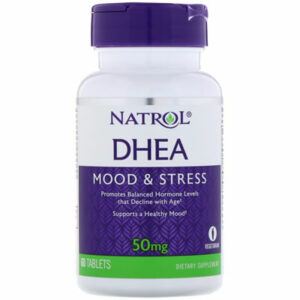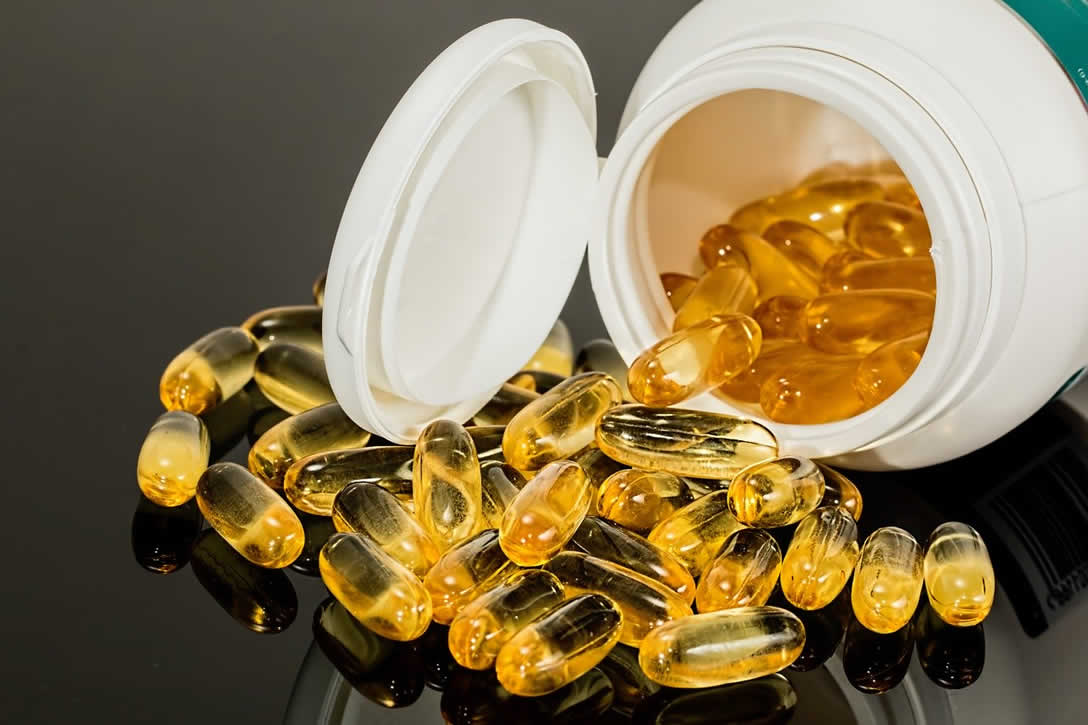DHEA (Dehydroepiandrosterone/Dehydroepiandrosterone) levels are considered to be related to many age-related phenomena or the deterioration of various physiological functions, including ischemic heart disease, endothelial dysfunction, atherosclerosis, osteoporosis, inflammation Sexual diseases, and sexual dysfunction.
Do you know what is DHEA benefits and side effects? Does the DHEA supplement really work?
Table of Contents
- What is DHEA?
- What are the benefits of DHEA?
- Are there any side effects of DHEA?
- Safety precautions
- How to use DHEA? What is the dosage?
- Where to buy the most recommended DHEA brand?
What is DHEA?
DHEA (dehydroepiandrosterone) and its sulfate form (DHEAS) are the most abundant steroid hormone precursors in the human body. They are composed of the adrenal cortical reticulum, gonads (testicles, ovaries), adipose tissue, brain, and skin Synthetic.
In target tissues, DHEA can be converted into androgen or estrogen through intracellular mechanisms, acting on specific receptors.
In addition to being a hormone precursor, DHEA can also directly bind to steroid hormones and nuclear receptors, can activate various cell membrane receptors, and regulate endothelial function, reduce inflammation, improve insulin sensitivity, blood flow, cellular immunity, body components, Bone metabolism, sexual function, neuroprotection, cognitive function, and memory.
The highest concentration of DHEA appears around the age of 20, and it gradually decreases by about 10% every ten years. By the age of 70 to 80, the level may be only 10%-20% when young.
What are the benefits of DHEA?
1. DHEA improves depression
Depression is a common emotional problem recently, often associated with mood disorders, major depression, seasonal affective disorder, situational depression or related emotions, bipolar disorder, or mental illness.
The main symptoms include loss of interest in activity, sadness, irritability, sense of worthlessness, hopelessness, guilt, worry about death, or suicidal thoughts.
Related symptoms may include changes in appetite, weight loss or gain, sleep disturbances, psychomotor activities, physical decline, indecision, or distraction.
A systematic literature review and meta-analysis (including 2 randomized controlled trials, a total of 68 patients with depression) pointed out that compared to placebo, oral DHEA (dehydroepiandrosterone, a daily dose between 30 and 450 mg for 6 weeks) helps to improve depression symptoms (as measured by Hamilton Depression Rating Scale).
*Conclusion: DHEA may have a positive effect on the improvement of depression symptoms, but it is limited to a small sample size and more research is needed to corroborate it.
2. DHEA maintains bone health
Currently, the definition of osteoporosis is based on the measurement of bone mineral density, which is the most reliable prediction of fracture risk.
Low bone density is an important public health problem for older women and men because it can cause fractures, disease, disability, and social costs.
Similar to women, osteoporosis is also common among men. Among men over 50 years old, 25% of people will have osteoporotic fractures.
A pooled analysis (including 4 double-blind randomized controlled trials with a total of 585 participants over 55) pointed out that compared with placebo, oral administration of DHEA in female subjects can increase DHEAS, testosterone, and estradiol and insulin-like growth factor 1 (IGF-1) can also increase bone density of the lumbar spine and trochanter, and maintain total hip bone density (but the effect of maintaining bone density is not seen in men).
*Conclusion: For female seniors, the use of DHEA may have a positive effect on the maintenance of bone density, but more research is still needed to confirm its effectiveness and safety in long-term use.
3. DHEA increases the success rate of in vitro artificial conception
In vitro fertilization is a common method of assisted reproductive technology. Today, the number of test-tube babies worldwide reaches millions, accounting for 1% to 3% of the total number of newborns in the United States and Europe each year.
Studies have shown that certain lifestyles and patient characteristics (eg, underweight, obesity, psychological stress, caffeine intake, alcohol consumption) and environmental exposure factors, including pesticides, PCBs, and other endocrine disruptors can be successful in conception Rate has a negative impact.
A systematic literature review and meta-analysis (including 6 randomized controlled trials with a total of 745 women undergoing in vitro artificial conception) pointed out that supplementation with DHEA can significantly increase clinical pregnancy rates and live birth rates (live birth rate), endometrial thickness, and the number of regenerated oocytes, but it has no significant effect on embryo transfer, miscarriage rate, and estradiol values after hCG administration.
*Conclusion: For female subjects undergoing in vitro artificial conception, the use of DHEA is helpful to improve the clinical pregnancy rate and live birth rate but is limited by the small sample size, and more large studies are still needed to corroborate.
4. DHEA improves sexual function
Sexual relationship is a complex phenomenon, influenced by cardiovascular, neurological, and hormonal factors, as well as the established biological traditions of individuals, interpersonal relationships, family and society, culture, and religion.
Sexual dysfunction in men, especially erectile dysfunction, has been widely studied and has effective treatments. However, female sexual dysfunction is more complicated and people know less about it.
Female sexual dysfunction is usually defined as one or more of the following four items, including sexual desire, sexual arousal, pain during sexual intercourse, and the inability to experience orgasm.
A systematic review (including 38 studies) pointed out that DHEA helps to improve sexual interest, lubrication, pain, sexual excitement, orgasm, and sexual frequency, and its effect is more significant in people with sexual dysfunction, especially for the peripheral Menopause and postmenopausal women.
*Conclusion: For women before and after menopause, the use of DHEA may have a positive effect on improving sexual function, but due to possible bias, more research is still needed to corroborate.
5. DHEA improves muscle strength and physical function
The best physical fitness state of the human body is between 20 and 30 years old. With the increase of age, muscle, and bone mass decreases, and physical fitness decreases, the body composition also changes. After 30 years of age, adults every 10 years Lose 3% to 8% of muscles. In addition, muscle strength (muscle strength) can be reduced by 12 to 15% every 10 years.
Muscle loss and reduced body function are the keys to maintaining an independent and independent life. Below average is often associated with impaired exercise and balance function, osteoarthritis, and increased risk of falls/fractures.
A systematic review (including 8 studies with a total of 661 adults over 50 years old) pointed out that some studies have shown that DHEA supplements can improve muscle strength (grip strength, chest press, leg press, knee extension, and flexion), Physical function and physical performance, but related results are still inconsistent.
*Conclusion: For older people, currently available data do not support the use of DHEA supplements to improve muscle strength or physical function.
Are there any side effects of DHEA?
Unlike most vitamins and minerals, DHEA is a strong hormone in the human body. Unless necessary, do not take it without permission or confirm with a doctor or pharmacist before use.
Generally, it is safe to take in the short term after evaluation by medical staff (oral dose below 50mg and lasts for 6 months).
Possible side effects include acne, hair loss, stomach upset, dizziness, and high blood pressure. Some women may experience menstrual disorders, abnormal hair growth, and low voice. Men may experience breast pain or breast growth.
Safety Precautions
1. Abnormal liver and kidney function, pregnant women, and lactating women should not use it (safety concerns).
2. DHEA has the function of neurotransmitter receptor regulation. Therefore, some studies have found that it can help regulate the brain circuit to achieve the effect of controlling drug addiction behavior (but still to be confirmed by large-scale research).
3. Do not use in patients with hormone-related cancer or a family history of these cancers, such as breast cancer, prostate cancer, ovarian cancer, adrenal cancer, and testicular cancer (because DHEA is a precursor of estrogen and testosterone).
4. Patients with endometriosis or polycystic ovary syndrome, please be careful, DHEA may make symptoms worse.
5. People with depression, bipolar disorder, or related emotional diseases, please be careful. After use, they may have side effects such as excitement, impulsivity, irritability, and mania.
6. May affect the effect of insulin, so please take regular monitoring of blood sugar in patients with diabetes.
7. Excessive use of DHEA by women may increase the production of male hormones, so it is prone to signs of virilization, such as hair loss, deepening of the voice, hair growth on the face, acne, etc.
8. Overdose of DHEA in men may also increase the chance of testicular shrinkage, male baldness, high blood pressure, or testosterone-related cancer.
9. May lower HDL cholesterol or increase triglyceride levels.
10. The use of high doses or long-term use may increase the chance of potentially serious side effects.
11. Because DHEA may increase testosterone levels in the body, it is prohibited in some professional sports.
12. Do not use selective estrogen receptor inhibitors such as Tamoxifen, Anastrozole, Exemestane, Fulvestrant, Letrozole (Remila film-coated tablets) combined use may reduce the efficacy of the drug.
13. Do not use in combination with drugs that undergo liver CYP450 enzyme action, which may increase the side effects of drugs. Related drugs are Lovastatin, ketoconazole, itraconazole, fexofenadine, triazolam… etc.
14. Do not use in combination with Corticosteroids, which may affect the effectiveness of DHEA supplements. Related drugs are Dexamethasone, dexamethasone, hydrocortisone, methylprednisolone, methylprednisolone, etc. prednisone.
15. Do not use Estrogen and Testosterone related supplements in combination, it may increase the chance of adverse reactions.
16. Do not use in combination with progesterone, it may cause false-positive detection of progesterone concentration.
How to use DHEA? What is the dosage?
DHEA can be used as an oral, intraoral spray, skin application cream, and gel. The following lists the oral dosage/dosage used in the study (but it is recommended to confirm with the doctor before use to avoid possible adverse reactions)
Depression: Take 30 to 50 mg daily for 6 to 8 weeks
Diminished ovarian reserve: 50 to 75 mg per day (in divided doses)
Aging skin: 50 mg daily for 1 year
Where to buy the most recommended DHEA brand?
In recent years, food safety problems in various countries have exploded, and it is not healthy but black-hearted products that everyone spends on. Therefore, European and American products with relatively strict quality control have become popular products.
And iHerb.com is a large-scale medical cosmetics e-commerce company in the United States. It has a high satisfaction rate of 97% in the evaluation of Google customers. It provides global home delivery so that you can buy it without risking buying fakes through purchasing high-quality health products.

